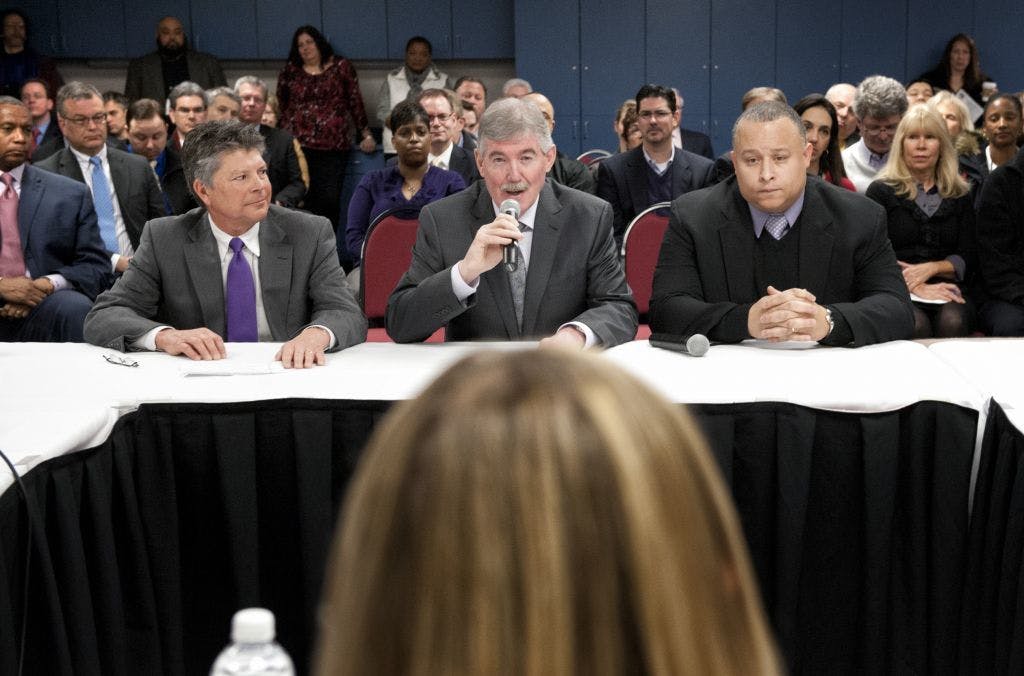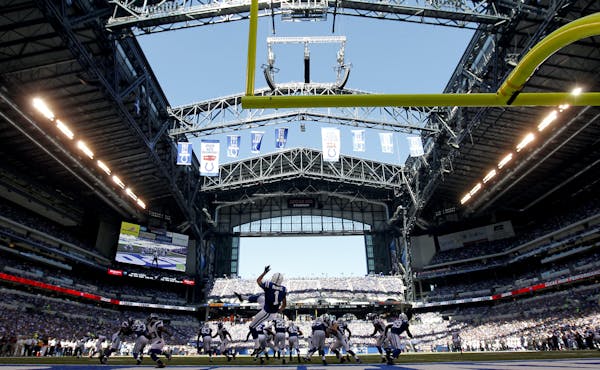A hometown firm with deep ties to the local workforce and a portfolio featuring more than 100 sports and entertainment venues has been awarded the job of building the nearly billion-dollar home for the Minnesota Vikings.
The Vikings and Minnesota Sports Facilities Authority on Friday made its most important hire to date, signing Mortenson Construction of Golden Valley to coordinate the building of a downtown Minneapolis stadium that promises to transform the city skyline by the time it opens in July 2016.
Mortenson is a familiar name on the local sports construction scene, having built new homes for the Twins, Wild, Timberwolves and University of Minnesota football team.
"There's just something that is very special about working on a project in your home community," said John Wood, senior vice president for Mortenson. "There's a big responsibility and a lot of accountability that comes with that. And we take that very seriously. And we intend to complete this project so that not only the authority and the Vikings will be pleased, but also so that every Minnesotan will be pleased with our work."
Friday's hire comes eight months before project groundbreaking and as the team prepares for its final season in the Metrodome.
As the project's construction manager, Mortenson could employ as many as 7,500 workers -- most from Minnesota -- over the course of a 33-month construction period, Wood said. It will earn $12.5 million but could make as much as $15 million if it finishes the project early or meets other incentives. The company also could face "substantial penalties" -- up to $5 million per NFL game missed -- if the stadium doesn't open on time, Wood said.
With just 33 months from a planned October groundbreaking to a projected July 2016 opening, time is short. But Wood said Mortenson, which built the Edward Jones Dome in St. Louis in 31 months, will meet that deadline and do so within budget.
"Our intention is to earn those bonuses and avoid the penalties," he said. "We understand our responsibility."
Mortenson won the job over a team of Hunt Construction, of Scottsdale, Ariz., and Kraus-Anderson, of Minneapolis. Hunt has built a dozen NFL stadiums, including several with retractable roofs or walls. One of those -- Lucas Oil Stadium in Indianapolis -- has long been the inspiration behind the Vikings' project.
Michele Kelm-Helgen, chairwoman of the stadium authority, which is working with the Vikings to oversee the $975 million development on the current Dome site, said Mortenson's national reputation and experience with dozens of sports venues were major factors in the hire. It also didn't hurt that the company has drawn much praise for its work building new homes for Minnesota sports teams, particularly Target Field.
Kelm-Helgen said the firm's final pricing fee also was "incredibly competitive." Mortenson submitted the low bid, she said, knocking off about $2 million from its initial bid.
Typically, a construction manager is paid 2 to 4 percent of the stadium's construction cost. Mortenson's fee came in at 1.7 percent. "I really don't think we'd have done it anywhere else other than here in our home state," Wood said.
Said Lester Bagley, a Vikings vice president: "If you take the issue of where Mortenson is based out of the equation, they still were the strongest team and the best fit. The bonus is they are the hometown team."
Local ties
Mortenson's tie to local subcontractors also was a strong selling point. With $498 million of public money in the project, Kelm-Helgen has consistently said that the bulk of the stadium jobs should go to Minnesota workers. As part of its contract, Mortenson, which also will work with Thor Construction of Minneapolis, has committed to reserving 20 percent of construction work for women- and minority-owned businesses from Minnesota.
"Having the main contractor 'local' means they already know the community," said Barb Lau, executive director of the Association of Women Contractors in St. Paul. "Instead of bringing an out-of-town plan into this market, they are already here and have a plan and have relationships built."
Minnesota lost about 50,000 construction jobs during the recession, said Dave Semerad, head of Associated General Contractors of Minnesota, which represents a range of commercial builders. Despite some recovery in recent years, he said, the state is still about 15,000 construction jobs short of where it was in February 2006.
"This is such a significant project because this recession is so wide and so deep," Semerad said. "And this will help put people back to work."
Wood said Mortenson will establish the budget immediately for what can be designed and built and draw up a construction timeline and work schedule. It also will provide a guaranteed maximum construction price for the 65,000-seat project later this fall, after scrutinizing and pricing every detail of the development with HKS Inc., the project architect.
One of Mortenson's first challenges will be to work with HKS on pricing a retractable roof, wall or window. The stadium-financing legislation approved last year calls for a fixed roof, but the Vikings and the authority prefer a retractable one, if it can be built within budget.
Adding a fully retractable roof to a stadium already designed for a fixed roof could add $25 million to $50 million to construction costs, several experts have said. Adding a wall or window would cost less.
The company, which hasn't built a retractable-roof stadium, also will have a voice on whether the Vikings play one or two seasons at TCF Bank Stadium, home of the University of Minnesota football team. Initially, the team planned to play the 2015 season at TCF while the Dome is razed. But Kelm-Helgen has said several times that it's likely the Vikings will play two seasons -- 2014 and 2015 -- at TCF.
Bagley said Friday that the team is operating under the assumption that the 2013 NFL season will be its last at the Metrodome. If it is, the stadium would probably be razed in early 2014 to make way for the new construction, Wood said.
"It feels great to turn the corner on the project finally," Bagley said Friday. "Let's get to work."
Richard Meryhew • 612-673-4425

Former Gov. Jesse Ventura boasts he could beat unpopular Trump or Biden if he ran for president

Dave Kleis says he won't run for sixth term as St. Cloud mayor
Newspaper boxes repurposed as 'Save a Life' naloxone dispensaries

St. Cloud house vies for Ugliest House in America


